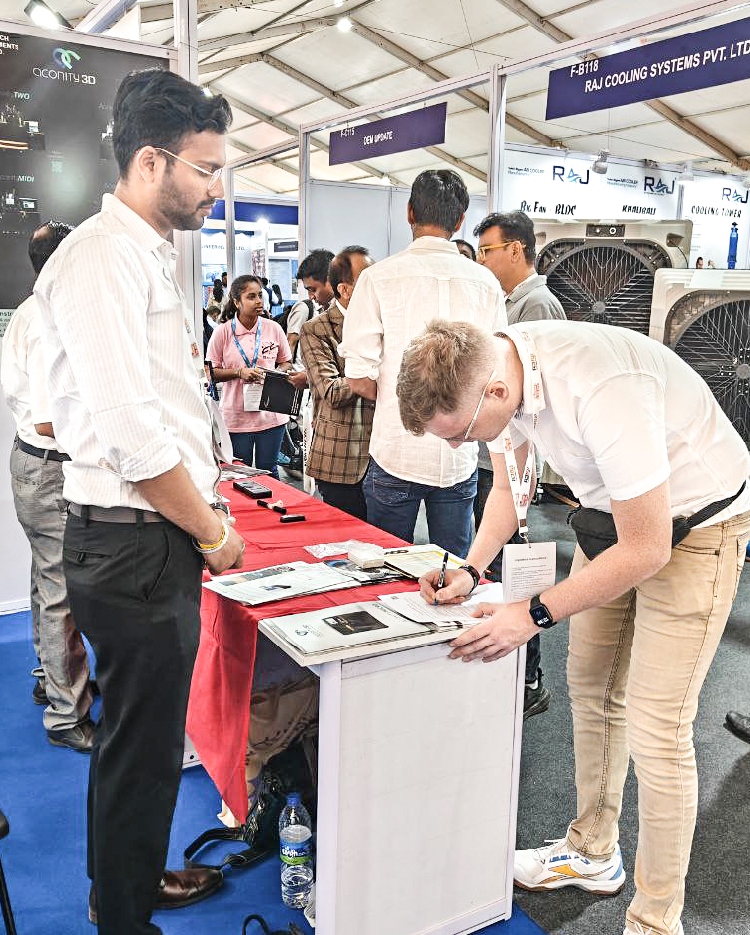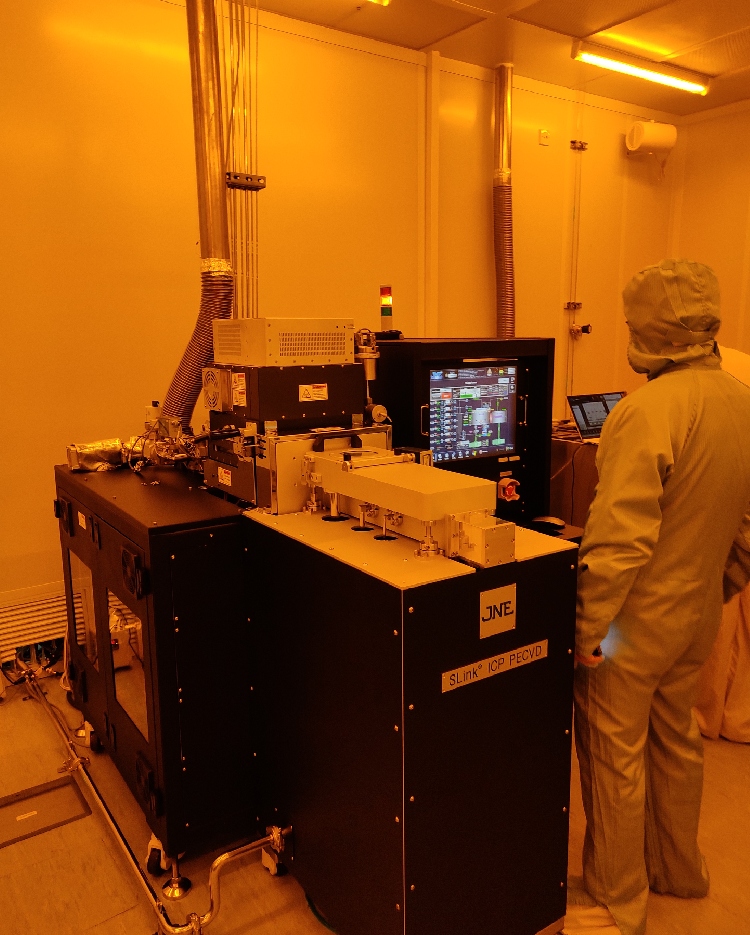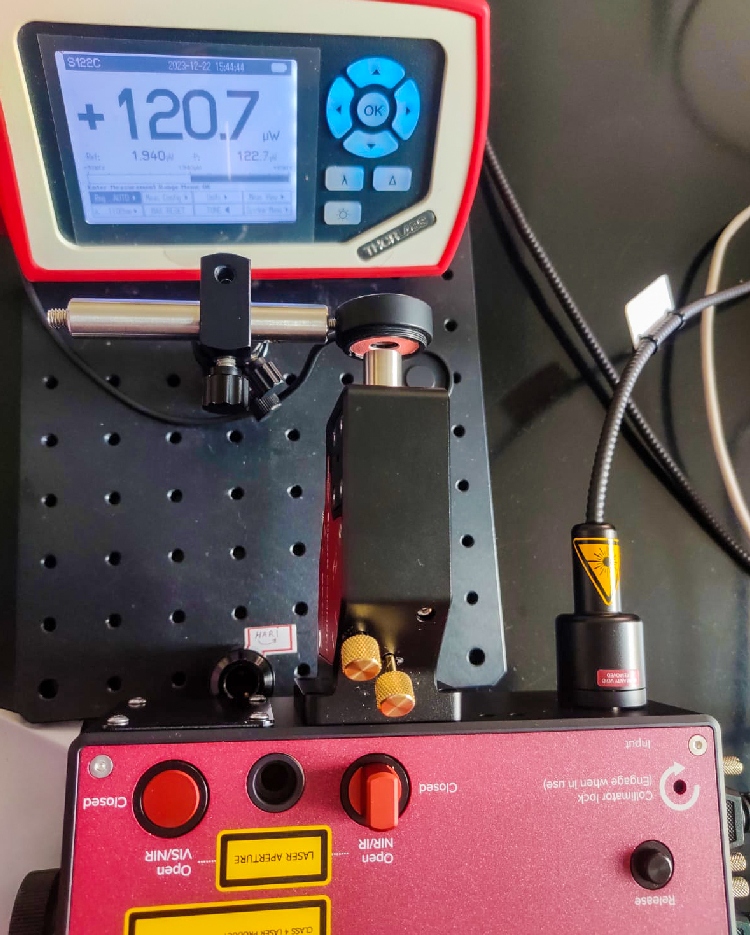Comparing laser engraving machines: CO2 lasers Vs Fiber lasers
Laser engraving is a process that facilitates the vaporization of materials into fumes in order to engrave deep and permanent marks.
Pune, India February [ 23-26, 2024 ]
We showcased pioneering laser technology and innovation at Pune's biggest Machine Tool Expo. Thank you for joining us at Booth No: F-C 128!

Chandigarh, India [ February 19, 2024 ]
We successfully installed the 150mm SLink® ICP-PECVD System, advancing semiconductor technology. Proud to have contributed to the next wave of innovation!

Trivandrum, India [ March 8, 2024 ]
Dynotech Solutions installed a cutting-edge Supercontinuum laser system. This included the superK VARIA with visible filters and the superK-SELECT for IR!

Delivering Cutting-Edge Solutions in Lasers, Semiconductors, and Spectroscopy for Advanced Research and Scientific Applications
Experience the difference with our cutting-edge laser applications, state-of-the-art semiconductor technologies, and high-resolution spectroscopy solutions. Each product and service is tailored to meet the unique needs of our clients, ensuring superior quality and performance.
At Dynotech Instruments, we are dedicated to bringing the most advanced and innovative technologies around the globe to the forefront of Indian scientific research and industrial applications. With over two decades of experience, we have established ourselves as a trusted partner for some of the world’s leading manufacturers in lasers, semiconductors, and spectroscopy solutions. Our mission is to provide cutting-edge technology that drives efficiency, precision, and innovation in every project.
We serve diverse sectors, including defence, space research, atomic energy, and academic institutions, ensuring our clients access state-of-the-art tools and technologies. Our exclusive partnerships with global leaders allow us to offer high-quality products such as laser beam delivery systems, LIOS sensing capabilities, and M2 measurement setups. These solutions are designed to meet the unique needs of our clients, helping them achieve their research and operational goals with precision and efficiency.
At Dynotech, we prioritize customer satisfaction, quality assurance, and sustainability. Our comprehensive services include spare parts provision, operational training, online support, and on-site repairs, providing peace of mind and ensuring smooth operations. Join us at Dynotech Instruments and experience the future of technology today.
Supporting leading institutions with cutting-edge technology and solutions.
Laser engraving is a process that facilitates the vaporization of materials into fumes in order to engrave deep and permanent marks.
Laser cleaning is an environment-friendly process altogether. It can be utilized to effectively remove contaminants from the surface of metals.
Prior to using a laser welding machine, it is important to verify a number of important parameters. Here are some important steps to ensure that
Laser micromachining is a process that uses focused laser beams to create intricate features on a variety of materials with high precision. In scientific research, it is used for tasks such as microfabrication of devices, structuring of surfaces for enhanced properties, and precise material removal for sample preparation. This technology is crucial in microelectronics, materials science, and biomedical engineering, where accuracy and detail are paramount. By employing laser micromachining, researchers can achieve results that are not possible with traditional machining methods.
Laser beam delivery systems highly guide and focus laser beams, essential for experiments requiring exact targeting. These systems ensure consistent beam quality and minimal deviation, improving the reliability of experimental results. They are used in applications like spectroscopy, materials processing, and laser-induced breakdown spectroscopy. The accuracy provided by these systems is critical for achieving reproducible and high-quality data in scientific research.
LIOS sensing technology provides real-time, distributed temperature and strain monitoring, which is invaluable in various research applications. This technology enhances safety by detecting anomalies early and improves experimental accuracy by providing continuous data. It's instrumental in environmental monitoring, structural health monitoring, and energy research. The ability to gather precise data over large areas or long distances without invasive methods makes LIOS sensing a powerful tool in scientific investigations.
An M2 measurement setup evaluates the quality of laser beams, which is crucial for research requiring precise beam parameters. This setup helps determine the beam's focus, divergence, and overall quality, ensuring optimal experiment performance. Accurate M2 measurements are essential for applications such as laser spectroscopy, materials processing, and biomedical research, where beam quality directly impacts the results. Regular M2 assessments help maintain consistency and reliability in laser-based research.
Laser photonics is used extensively in scientific research for applications such as spectroscopy, microscopy, and optical trapping. It enables high-precision measurements and manipulations at microscopic scales, essential in biology, chemistry, and physics. Laser photonics also facilitates advanced imaging techniques and the study of light-matter interactions. Its versatility and precision make it a fundamental tool in modern scientific investigations.
Semiconductor technology is at the core of many scientific advancements, enabling the development of sophisticated electronic devices and sensors. In research, semiconductors are used to create high-performance detector amplifiers, and integrated circuits essential for data collection and analysis. This technology supports advancements in nanotechnology, quantum computing, and renewable energy. By enabling precise control over electrical properties, semiconductors facilitate experiments that drive innovation and discovery in science.
High-resolution spectroscopy provides detailed information about the composition and properties of materials by analyzing their interaction with light. This technique is crucial for identifying chemical compounds, studying molecular structures, and investigating physical properties. It is widely used in chemistry, physics, and environmental science. High-resolution spectroscopy helps researchers understand complex phenomena and develop new materials and processes.
Advanced semiconductor solutions offer high performance, scalability, and energy efficiency, making them ideal for scientific research. These solutions enable the development of sensitive detectors, high-speed processors, and efficient power devices. They are critical in space exploration, medical diagnostics, and environmental monitoring. By providing reliable and precise electronic components, advanced semiconductor solutions enhance the capabilities of research instruments and systems.
Laser micromachining allows for precisely fabricating biomedical devices, such as microfluidic chips, sensors, and implants. It enables the creation of intricate features and complex geometries essential for medical applications. This technology is used in tissue engineering, drug delivery systems, and diagnostic tools. Laser micromachining improves the quality and functionality of biomedical devices by providing high precision and minimal thermal damage.
LIOS sensing technology monitors real-time environmental conditions, such as temperature and strain. This technology is critical for studying climate change, natural disasters, and infrastructure health. It provides continuous data over large areas, helping researchers detect changes and predict future events. LIOS sensing enhances the accuracy and reliability of environmental research, contributing to better understanding and management of natural resources.
M2 measurement evaluates the quality of laser beams, ensuring they meet the precise requirements needed for scientific research. This assessment helps optimize laser performance for spectroscopy, microscopy, and materials processing applications. High-quality laser beams lead to more accurate and reliable experimental results. Regular M2 measurements maintain the consistency and effectiveness of laser systems used in research.
Laser beam delivery systems provide precise control over laser beams, which is essential for materials processing and analysis. They enable accurate targeting, high precision, and consistent beam quality. These systems are used in materials science for cutting, welding, and surface modification. The precision and efficiency of laser beam delivery systems improve the quality and reproducibility of experimental results in materials research.
Semiconductors are integral to the functionality of scientific instruments, providing the necessary electronic components for data acquisition, signal processing, and control. They enable the development of advanced detectors, sensors, and processors. Semiconductors improve the performance, sensitivity, and efficiency of scientific instruments, supporting a wide range of research applications from particle physics to environmental monitoring.
High-resolution spectroscopy is essential for chemical analysis as it allows for precisely identifying and quantifying chemical compounds. This technique provides detailed spectral information, helping researchers understand molecular structures and chemical interactions. It is widely used in chemistry, biochemistry, and environmental science. The accuracy and sensitivity of high-resolution spectroscopy make it a powerful tool for detecting and analyzing trace elements and compounds.
Laser photonics supports medical research by enabling precise and non-invasive diagnostic and therapeutic techniques. It is used in imaging, laser surgery, and optical coherence tomography. Laser photonics facilitates the study of biological processes at the cellular and molecular levels. Its precision and versatility improve the accuracy and effectiveness of medical research, leading to better diagnostic tools and treatment methods.
Semiconductor technology is critical for quantum research as it enables the development of quantum dots, transistors, and integrated circuits essential for quantum computing and communication. It provides the materials and devices needed to manipulate and measure quantum states. Advances in semiconductor technology drive the progress of quantum research, leading to breakthroughs in computation, encryption, and sensing.
Laser micromachining enhances microelectronics research by enabling the fabrication of small, intricate components with high precision. It is used to create microchips, sensors, and interconnects. This technology allows for the miniaturization and integration of electronic devices, improving their performance and functionality. Laser micromachining supports the development of next-generation microelectronics with enhanced capabilities.
LIOS sensing is used in infrastructure monitoring to detect temperature changes and strain in structures such as bridges, tunnels, and buildings. It provides real-time data that helps assess the health and safety of infrastructure. This technology aids in the early detection of potential failures and supports maintenance planning. LIOS sensing enhances the reliability and longevity of infrastructure by providing continuous monitoring and timely information.
M2 measurement ensures the quality of laser beams used in spectroscopy, impacting the accuracy and resolution of spectroscopic measurements. High-quality beams provide better signal-to-noise ratios and sharper spectral lines. This improvement is crucial for detailed analysis and identification of chemical compounds. Regular M2 measurements maintain the performance of laser systems, ensuring reliable and precise spectroscopic data.
Future advancements in laser photonics include the development of more powerful and efficient lasers, new laser wavelengths, and improved beam delivery systems. These advancements will enhance applications in medical diagnostics, communication, and materials processing. Innovations in laser photonics will also drive progress in scientific research, enabling new experimental techniques and discoveries. The continuous evolution of laser technology will expand its capabilities and applications across various fields.
At Dynotech, we're searching for innovative thinkers and dedicated professionals eager to impact the world positively. Explore exciting opportunities on our Careers page or submit your resume directly to: careers@dynotech.com
Join us Our team